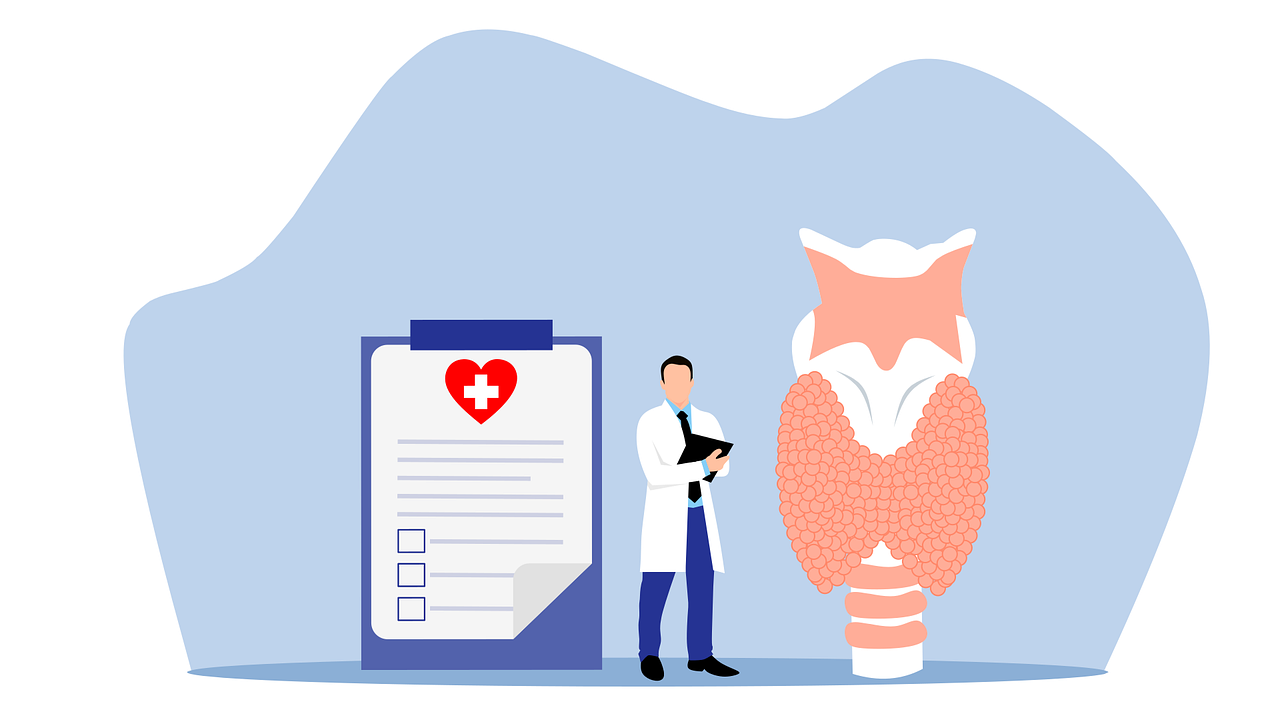Hyperthyroidism is when the thyroid gland produces too many hormones concerning the patient's needs. The condition of excess thyroid hormones manifests itself as an acceleration of the body. Some factors predispose to its development. Hyperthyroidism produces an extensive range of bothersome symptoms.
Diagnosis of this condition is based on testing of hormone levels. There are many treatments for hyperthyroidism. Untreated hyperthyroidism can lead to dangerous complications. Excessive production of thyroid hormones is much more common in women. This is due to the hormonal processes that women go through at different times in their lives.
The thyroid gland belongs to the endocrine glands. They are organs specialized in the production and secretion of hormones. A thyroid is located on the front of the neck. The gland has a couple of essential functions. But the most important role is hormone production. The thyroid gland secretes three hormones into the blood:
The hypothalamus regulates hormone production by the thyroid gland. The pituitary gland produces thyrotropic hormone (TSH)![]() . This type of hormone controls thyroid function. TSH stimulates the thyroid gland to create and secrete thyroid hormones properly.
. This type of hormone controls thyroid function. TSH stimulates the thyroid gland to create and secrete thyroid hormones properly.
Hormones produced by the thyroid affect every cell in our body. Metabolism, growth, and development depend on these hormones. Their influence on the human body is fundamental, so any problems with thyroid function can lead to health complications.
With hyperthyroidism, there is a low level of the TSH hormone. Too much thyroid hormone impairs brain function. The pituitary gland stops producing thyrotropic hormone, which stimulates thyroid function. Therefore, with thyroid disorders, it is necessary to test the level of TSH hormone.
Hormones produced by the thyroid gland perform many useful and necessary functions. Each type of hormone is responsible for many processes. Thyroxine and triiodothyronine are essential as early as fetal life. Therefore, the thyroid gland is primarily responsible for human development. In addition, hormones affect metabolism and the work of the entire body.

Thyroid functions include:
Thyroid hormones play a massive role in the metabolism![]() of proteins, fats, and carbohydrates. They stimulate the synthesis and degradation of proteins. They affect carbohydrate metabolism and fat synthesis. They increase metabolic rate and heat production.
of proteins, fats, and carbohydrates. They stimulate the synthesis and degradation of proteins. They affect carbohydrate metabolism and fat synthesis. They increase metabolic rate and heat production.
Thyroid hormones are also involved in bone formation. Proper hormone levels contribute to good bone strength. Thus, the thyroid gland significantly influences human growth and development![]() .
.
In addition to this, the thyroid is also related to sexual and reproductive aspects![]() . Hormone production affects fertility. It maintains adequate libido levels in both men and women. In addition, it is responsible for the proper course of the menstrual cycle and the course of pregnancy.
. Hormone production affects fertility. It maintains adequate libido levels in both men and women. In addition, it is responsible for the proper course of the menstrual cycle and the course of pregnancy.
The thyroid gland also has a significant impact on brain function. Thyroid hormones are essential for appropriately developing the nervous system![]() and its physiological functioning. The thyroid affects mood regulation, including the production of serotonin.
and its physiological functioning. The thyroid affects mood regulation, including the production of serotonin.

Many factors contribute to the excessive production of thyroid hormones. Often various types of diseases contribute to it. Hormone metabolism can also be affected by inadequate medical treatment or excessive nutrient intake. The most common causes of hyperthyroidism include:
Graves-Basedow disease – is related to the thyroid gland. During this autoimmune disease, the body produces antibodies. Then the antibodies stimulate the thyroid gland to secrete hormones. In addition, the antibodies can also cause eye symptoms called thyroid orbitopathy. The symptoms of Graves-Basedow disease are similar to those of other types of hyperthyroidism.
Nodular goiter – an enlargement of all or part of the thyroid gland. As this gland enlarges, nodules may appear in the neck area. Symptoms of thyroid gland enlargement appear, such as feeling pressure in the neck area and sometimes difficulty breathing and swallowing food or shortness of breath. There are different types of nodular goiter, which have other causes. The occurrence of nodular goiter may be related to iodine deficiency.
Thyroiditis – acute inflammation is characterized by a relatively short course and severe symptoms. In contrast, in the subacute stage, symptoms are milder, but the course time may be longer. The causes are bacterial and viral inflammation. Depending on the type of thyroiditis, symptoms can vary. There may be symptoms typical of a cold.
The pituitary adenoma – is a neoplasm that affects the secretion of TSH. Hypopituitarism means an excess of pituitary hormones. Its most common cause is pituitary tumors (usually adenomas) that secrete or release pituitary hormones excessively. Adenomas develop slowly, and treatment is multidirectional.
Hashimoto's disease – is a condition in which the immune system attacks the thyroid gland. Hashimoto's is most often related to hypothyroidism. However, in some cases, there is transient mild hyperthyroidism. Thus, occasionally, hyperthyroidism, referred to as Hashitoxicosis develops. It is most often caused by the coexistence of Hashimoto's and Graves-Basedow's disease. When thyroid hormones are overdosed, hyperthyroidism can also be triggered by treating Hashimoto's disease.
Excessive amounts of iodine – the body of a healthy person is unlikely to have a problem taking in large parts of iodine from food. However, there can be trouble for people struggling with autoimmune diseases. That's when supplementing too much iodine and providing very high amounts of iodine with food can cause hyperthyroidism.
Thyroid disorders often produce symptoms that are easily confused with other diseases. Therefore, thyroid tests are performed frequently, in addition to other tests, when there is a likelihood of thyroid malfunction. The range of symptoms can vary, depending on the cases. In older people, symptoms of hyperthyroidism may be less intense.
General symptoms of hyperthyroidism include:
Hyperthyroidism causes a lot of changes in the body. Common symptoms are unintentional weight loss![]() and a paradoxical increase in appetite
and a paradoxical increase in appetite![]() . An overactive thyroid produces too many hormones relative to what the body needs, resulting in a greatly accelerated metabolism and the body using too much energy. Therefore, weight loss and problems maintaining a healthy weight can occur despite an increased appetite.
. An overactive thyroid produces too many hormones relative to what the body needs, resulting in a greatly accelerated metabolism and the body using too much energy. Therefore, weight loss and problems maintaining a healthy weight can occur despite an increased appetite.
Accelerated metabolism also affects the sensation of heat![]() . Patients with hyperthyroidism often complain of sweating and the oppressive feeling of warmth. This makes them more sensitive to high temperatures. Hair loss and baldness may also occur. Hair growth is affected by sex hormones and thyroid hormones. Disorders in these areas can cause excessive hair loss and weakened hair condition.
. Patients with hyperthyroidism often complain of sweating and the oppressive feeling of warmth. This makes them more sensitive to high temperatures. Hair loss and baldness may also occur. Hair growth is affected by sex hormones and thyroid hormones. Disorders in these areas can cause excessive hair loss and weakened hair condition.
Accelerated body processes caused by hyperthyroidism also contribute to swift bowel movements. Therefore, gastrointestinal symptoms such as hyperdefecation (not diarrhea) occur. Heart problems![]() also arise. Irregular heartbeat and accelerated heartbeat that is – arrhythmia and tachycardia. Hyperthyroidism is also associated with increased blood flow in the muscular system. Because of this, tremors in the limbs or muscle weakness can occur.
also arise. Irregular heartbeat and accelerated heartbeat that is – arrhythmia and tachycardia. Hyperthyroidism is also associated with increased blood flow in the muscular system. Because of this, tremors in the limbs or muscle weakness can occur.
In addition, disturbed metabolism affects sleep. This can lead to feelings of irritability and insomnia![]() . Anxiety, tearfulness, psychomotor agitation, and difficulty focusing attention may also occur. In women, menstrual cycle disorders are often. Also ocular symptoms such as exophthalmos can occur with Graves-Basedow disease.
. Anxiety, tearfulness, psychomotor agitation, and difficulty focusing attention may also occur. In women, menstrual cycle disorders are often. Also ocular symptoms such as exophthalmos can occur with Graves-Basedow disease.
Hyperthyroidism is associated with menstrual disorders![]() that are difficult to predict. Such as the absence of menstruation or irregular or infrequent menstrual bleeding. Proper treatment of thyroid disease normalizes the menstrual cycle. As the thyroid is related to sex hormones, it also affects fertility. However, fertility disorders with hyperthyroidism are relatively rare.
that are difficult to predict. Such as the absence of menstruation or irregular or infrequent menstrual bleeding. Proper treatment of thyroid disease normalizes the menstrual cycle. As the thyroid is related to sex hormones, it also affects fertility. However, fertility disorders with hyperthyroidism are relatively rare.
Hyperthyroidism can be diagnosed with a blood test. The test results analyze the level of TSH concentration. When a patient has hyperthyroidism – the TSH level is relatively low![]() . Next, levels of thyroxine and triiodothyronine are analyzed. In this case, the levels of these hormones must be elevated to fully diagnose hyperthyroidism.
. Next, levels of thyroxine and triiodothyronine are analyzed. In this case, the levels of these hormones must be elevated to fully diagnose hyperthyroidism.
Once hyperthyroidism is diagnosed, the doctor may therefore order additional tests. Such tests are ultrasound of the thyroid gland and analysis of serum antithyroid antibodies. This predisposes to confirmation of Graves-Basedow disease. But a biopsy is also performed to ensure the nature of the lesions. A thyroid biopsy involves taking a small sample of thyroid tissue.
Also helpful in diagnosing hyperthyroidism is a chest X-ray. This type of radiological examination shows whether the gland is expanding toward the trachea. The use of X-rays in the diagnosis of thyroid disease can diagnose subacute thyroid type.

There are various treatments for hyperthyroidism. The treatment method choice depends on the cause of the disease. Also, the age and health status of the patient matter. Treatment methods for hyperthyroidism include:
Each method has its advantages and disadvantages and is used for specific causes of hyperthyroidism. Successful treatment of hyperthyroidism depends on taking the medication regularly and following the doctor's instructions.
Untreated hyperthyroidism can lead to severe disorders that threaten life or health. With early diagnosis and proper treatment, hyperthyroidism does not diminish the quality of life. Only unrecognized disease or interrupted treatment negatively affects the patient's life and can lead to complications.
The mainstay of thyroid treatment is the use of medication. It is the first step. Antithyroid drugs![]() are used for this purpose. This type of medication inhibits the production of thyroid hormones. The initial period of treatment lasts about a few weeks. Later, a decision is made on further treatment. It is then possible to continue drug treatment if it has been sufficiently compelling. If not, other treatment methods, such as surgery, are undertaken.
are used for this purpose. This type of medication inhibits the production of thyroid hormones. The initial period of treatment lasts about a few weeks. Later, a decision is made on further treatment. It is then possible to continue drug treatment if it has been sufficiently compelling. If not, other treatment methods, such as surgery, are undertaken.
Doses of antithyroid drugs are selected individually. The concentration of thyroid hormones in the blood is taken into account. The medication should be taken for the time specified by the doctor. It usually lasts from several weeks to several months. Drug treatment should not be interrupted. This can lead to a relapse.
Beta-blockers![]() are other drugs that can also be used for excessive hormone production. This type of medication blocks the action of thyroid hormones. But these drugs do not reduce the concentration of thyroid hormones in the blood. This is a type of symptomatic treatment. Its purpose is to relieve the symptoms of hyperthyroidism. It is an additional treatment combined with other therapies.
are other drugs that can also be used for excessive hormone production. This type of medication blocks the action of thyroid hormones. But these drugs do not reduce the concentration of thyroid hormones in the blood. This is a type of symptomatic treatment. Its purpose is to relieve the symptoms of hyperthyroidism. It is an additional treatment combined with other therapies.
It is a radical method of treating hyperthyroidism. Iodine is administered orally. The thyroid gland captures iodine, and its radiation slowly and permanently damages the thyroid cells. The final effect of treatment can often be assessed only months after iodine administration. Another effect of treatment with radioactive iodine![]() is a reduction in the size of the entire gland.
is a reduction in the size of the entire gland.
The decision to treat with radioisotope or surgery is made when drug treatment does not help or is insufficient. Which treatment is used depends mainly on the conclusion of the patient himself. Both radioisotope treatment and surgery can lead to a situation where there is inadequate thyroid hormone in the body. Therefore, the risk is hypothyroidism.
Surgery is a last resort for patients with nodular goiter, which causes pressure symptoms in the form of breathing or swallowing problems, and those with diagnosed thyroid cancer and undetermined tumor malignancy potential. Thyroid patients often choose not to have surgical intervention when drug treatment and other methods are unsuccessful. An enlarged thyroid gland can be reduced in size by surgery.
This method of treatment also carries the risk of hypothyroidism. After surgery, even lifelong supplementation of thyroid hormones may be necessary. The extent of thyroid surgery depends primarily on the type of condition and the size of the lesion undergoing surgery. Complete excision of the thyroid gland along with the dividing node is called a thyroidectomy, and indications for its performance are diagnosed as thyroid cancer, Graves-Basedow disease, and the presence of bilateral multinodular goiter.

Untreated hyperthyroidism can negatively affect various areas of the body. The effects of excess thyroid hormones in the body are called thyrotoxicosis. This term is used for a syndrome of symptoms resulting from an excessive concentration of thyroid hormones.
This condition is confirmed in patients whose hyperthyroidism was untreated. Also, inadequately treated thyroid gland can also lead to it. Then, it can lead to thyrotoxicosis. Untreated hyperthyroidism can lead to the following diseases and conditions:
Hyperthyroidism can lead to ischemic disease – as atherosclerotic lesions are accelerated due to metabolism. Therefore, there is a risk of heart attack![]() . Also, atrial fibrillation and stroke are possible consequences of untreated hyperthyroidism.
. Also, atrial fibrillation and stroke are possible consequences of untreated hyperthyroidism.
Too much thyroid hormones in the body can make our bones attack osteoporosis![]() . Long-term hyperthyroidism increases the risk of bone fracture. The condition is associated with a marked slowdown in bone remodeling processes.
. Long-term hyperthyroidism increases the risk of bone fracture. The condition is associated with a marked slowdown in bone remodeling processes.
Thyroid storm![]() , on the other hand, is the most severe complication. It is a condition of sudden and violent disruption of the body's work. If untreated, can lead to death. A thyroid storm is an aggravation of the symptoms of hyperthyroidism. It arises due to the body's intolerance of excess thyroid hormones, mainly affecting the central nervous system.
, on the other hand, is the most severe complication. It is a condition of sudden and violent disruption of the body's work. If untreated, can lead to death. A thyroid storm is an aggravation of the symptoms of hyperthyroidism. It arises due to the body's intolerance of excess thyroid hormones, mainly affecting the central nervous system.
Hyperthyroidism is a dysfunction. It is characterized by excessive production of thyroid hormones. Critical symptoms of hyperthyroidism include unintentional weight loss, increased sweating, and menstrual cycle disorders in women. Many factors predispose to hyperthyroidism. It appears in numerous conditions, including Graves-Basedow disease, among others.
The diagnosis of hyperthyroidism involve testing hormone levels and imaging studies. There are various methods of treatment. At first, pharmacotherapy is usually used. If it does not have the desired effect, surgery to remove the thyroid gland or administration of radioactive iodine is an option.